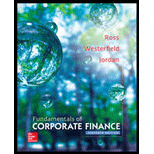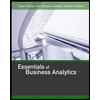
Fundamentals of Corporate Finance
11th Edition
ISBN: 9780077861704
Author: Stephen A. Ross Franco Modigliani Professor of Financial Economics Professor, Randolph W Westerfield Robert R. Dockson Deans Chair in Bus. Admin., Bradford D Jordan Professor
Publisher: McGraw-Hill Education
expand_more
expand_more
format_list_bulleted
Question
Chapter 6, Problem 4M
Summary Introduction
Case summary:
Person B has completed his graduation before six years with an undergraduate degree in finance. His aim is to become an investment banker, though he is satisfied with the present job. Person B was searching for the best college to do MBA program, which he thinks that would assist in achieving his aim. He was looking for University W and College M. The details of Person B's current job and his course details are provided.
Characters in the case:
- Person B
- University W
- College M
Adequate information:
- Person B is not allowed to work anywhere until the completion of MBA program.
- The salaries are not paid for the internship course.
Given statement:
Person B believes that the appropriate analysis is to compute the
To evaluate: The given statement
Expert Solution & Answer
Want to see the full answer?
Check out a sample textbook solution
Students have asked these similar questions
Lara Fredericks is interested in two mutually exclusive investments. Both investments cover the same time horizon of 5 years. The cost of the first investment is $9900, and Lara expects equal and consecutive year-end payments of $3400. The second investment promises equal and consecutive payments of $4100 with an initial outlay of $12500 required. The current required return on the first investment is 8.4 %, and the second carries a required return of 10.4 %.a. What is the net present value of the first investment?b. What is the net present value of the second investment?c. Being mutually exclusive, which investment should Lara choose? d. Which investment is relatively more risky? Explain.
What are some of the characteristics of a firm with a long operating cycle?
About this Assignment
For this Corporate Finance 301 assignment, you will submit a research paper that analyzes the types of organizational business
structures. You will apply knowledge of business structure concepts as acquired in the course. The research paper should follow APA
formatting style.
Project Prompts
The written research paper should be at least 1,000 to 1,200 words in length and should include four sections based on the business
structures studied throughout the course. Define each business structure, compare the corporate finance strategies of the four business
structures, discuss the advantages and disadvantages of each business structure, and how each varies in taxation.
Research Paper Sections
⚫ Sole Proprietorship
⚫ Partnership
• Corporation
⚫ Limited Liability Company (LLC)
Chapter 6 Solutions
Fundamentals of Corporate Finance
Ch. 6.1 - Prob. 6.1ACQCh. 6.1 - Prob. 6.1BCQCh. 6.1 - Unless we are explicitly told otherwise, what do...Ch. 6.2 - In general, what is the present value of an...Ch. 6.2 - In general, what is the present value of a...Ch. 6.3 - If an interest rate is given as 12 percent...Ch. 6.3 - What is an APR? What is an EAR? Are they the same...Ch. 6.3 - Prob. 6.3CCQCh. 6.3 - What does continuous compounding mean?Ch. 6.4 - What is a pure discount loan? An interest-only...
Ch. 6.4 - What does it mean to amortize a loan?Ch. 6.4 - Prob. 6.4CCQCh. 6 - Two years ago, you opened an investment account...Ch. 6 - A stream of equal payments that occur at the...Ch. 6 - Your credit card charges interest of 1.2 percent...Ch. 6 - What type of loan is repaid in a single lump sum?Ch. 6 - Annuity Factors [LO1] There are four pieces to an...Ch. 6 - Prob. 2CRCTCh. 6 - Prob. 3CRCTCh. 6 - Present Value [LO1] What do you think about the...Ch. 6 - Prob. 5CRCTCh. 6 - Prob. 6CRCTCh. 6 - APR and EAR [LO4] Should lending laws be changed...Ch. 6 - Prob. 8CRCTCh. 6 - Prob. 9CRCTCh. 6 - Prob. 10CRCTCh. 6 - Prob. 11CRCTCh. 6 - Prob. 12CRCTCh. 6 - Prob. 1QPCh. 6 - Prob. 2QPCh. 6 - Prob. 3QPCh. 6 - Prob. 4QPCh. 6 - Calculating Annuity Cash Flows [LO1] If you put up...Ch. 6 - Calculating Annuity Values [LO1] Your company will...Ch. 6 - Calculating Annuity Values [LO1] If you deposit...Ch. 6 - Calculating Annuity Values [LO1] You want to have...Ch. 6 - Prob. 9QPCh. 6 - Calculating Perpetuity Values [LO1] The Maybe Pay...Ch. 6 - Prob. 11QPCh. 6 - Prob. 12QPCh. 6 - Calculating APR [LO4] Find the APR, or stated...Ch. 6 - Calculating EAR [LO4] First National Bank charges...Ch. 6 - Prob. 15QPCh. 6 - Prob. 16QPCh. 6 - Prob. 17QPCh. 6 - Calculating Present Values [LO1] An investment...Ch. 6 - EAR versus APR [LO4] Big Doms Pawn Shop charges an...Ch. 6 - Prob. 20QPCh. 6 - Calculating Number of Periods [LO3] One of your...Ch. 6 - Calculating EAR [LO4] Friendlys Quick Loans, Inc.,...Ch. 6 - Prob. 23QPCh. 6 - Calculating Annuity Future Values [LO1] You are...Ch. 6 - Calculating Annuity Future Values [LO1] In the...Ch. 6 - Prob. 26QPCh. 6 - Prob. 27QPCh. 6 - Prob. 28QPCh. 6 - Simple Interest versus Compound Interest [LO4]...Ch. 6 - Prob. 30QPCh. 6 - Prob. 31QPCh. 6 - Prob. 32QPCh. 6 - Calculating Future Values [LO1] You have an...Ch. 6 - Calculating Annuity Payments [LO1] You want to be...Ch. 6 - Prob. 35QPCh. 6 - Prob. 36QPCh. 6 - Prob. 37QPCh. 6 - Growing Annuity [LO1] Your job pays you only once...Ch. 6 - Prob. 39QPCh. 6 - Calculating the Number of Payments [LO2] Youre...Ch. 6 - Prob. 41QPCh. 6 - Prob. 42QPCh. 6 - Prob. 43QPCh. 6 - Prob. 44QPCh. 6 - Prob. 45QPCh. 6 - Prob. 46QPCh. 6 - Prob. 47QPCh. 6 - Prob. 48QPCh. 6 - Prob. 49QPCh. 6 - Calculating Present Value of a Perpetuity [LO1]...Ch. 6 - Prob. 51QPCh. 6 - Prob. 52QPCh. 6 - Calculating Annuities Due [LO1] Suppose you are...Ch. 6 - Prob. 54QPCh. 6 - Prob. 55QPCh. 6 - Prob. 56QPCh. 6 - Prob. 57QPCh. 6 - Prob. 58QPCh. 6 - Prob. 59QPCh. 6 - Prob. 60QPCh. 6 - Calculating Annuity Values [LO1] You are serving...Ch. 6 - Prob. 62QPCh. 6 - Calculating EAR with Points [LO4] The interest...Ch. 6 - Prob. 64QPCh. 6 - Prob. 65QPCh. 6 - Prob. 66QPCh. 6 - Prob. 67QPCh. 6 - Calculating Annuity Payments [LO1] This is a...Ch. 6 - Prob. 69QPCh. 6 - Prob. 70QPCh. 6 - Prob. 71QPCh. 6 - Calculating Interest Rates [LO4] A financial...Ch. 6 - Prob. 73QPCh. 6 - Prob. 74QPCh. 6 - Ordinary Annuities and Annuities Due [LO1] As...Ch. 6 - Calculating Growing Annuities [LO1] You have 40...Ch. 6 - Prob. 77QPCh. 6 - Prob. 78QPCh. 6 - Prob. 79QPCh. 6 - Prob. 80QPCh. 6 - Prob. 1MCh. 6 - Prob. 2MCh. 6 - Prob. 3MCh. 6 - Prob. 4MCh. 6 - Prob. 5MCh. 6 - Prob. 6M
Knowledge Booster
Similar questions
- PLEASE ANSWER THE COLUMN FULLY AND CORRECTLY PLEASE DO THE RIGHT CALCULATION DOUBLE CHECK AS WELL TO GIVE ME THE RIGHT ANSWER REQUIRED: Given the following information, what are the NZD/SGD currency against currency bid-ask quotations? Note: Do not round intermediate calculations. Round your answers to 4 decimal places. Bank Quotations American Terms European Terms Bid Ask Bid Ask New Zealand dollar 0.733 0.7340 1.3870 1.3884 Singapore dollar 0.6186 0.6191 1.6423 1.6436 answer Bid Ask New Zealand dollar ? ? Singapore dollar ? ?arrow_forwardAbout this Assignment For the Corporate Finance 301 assignment, you will submit a research paper that analyzes and discusses organizational financial risks. You will apply knowledge acquired in the course and use the concepts of multiple financial risks as the basis of research and analysis. The research paper should follow APA formatting style. Audience: upper-level business students. Project Prompt Write a 1,000-1,200-word analysis discussing financial risk concepts and assess the impact of the different financial risks on an organization. For this assignment, you will structure your assignment using four research paper sections associated with corporate risk management, as studied in the course. Base your research paper on the financial statements analyzed in Corporate Finance 301 assignment 2 and apply the knowledge acquired in the analysis. Define each financial risk, discuss the risk associated components, and evaluate the financial risks and how they affect the corporation's…arrow_forwardBobby Nelson, made deposits of $880 at the end of each year for 6 years. Interest is 6% compounded annually. What is the value of Bobby’s annuity at the end of 6 years?arrow_forward
- 1. Find the future value if $1,250 is invested in Simple interest account paying 6.5%: a. for 5 years b. for 20 years 2. Find the future amount $ 35,000 is invested for 30 years at 4.25% compounded: a. annually b. Quarterly c. monthly d. weekly 3. How much should be put into an account today that pays 7.75% compounded monthly if you need $10,000 in 5 years. 4. Find the effective rate for: a. 5.75% compounded quarterly b. 6.25% compounded daily. 5. $50 is invested at the end of each month into an account paying 7.5% compounded monthly. How much will be in the account after 5 years?…arrow_forwardSolve step by step no aiarrow_forwardDont use ai solve itarrow_forward
arrow_back_ios
SEE MORE QUESTIONS
arrow_forward_ios
Recommended textbooks for you
 Essentials of Business Analytics (MindTap Course ...StatisticsISBN:9781305627734Author:Jeffrey D. Camm, James J. Cochran, Michael J. Fry, Jeffrey W. Ohlmann, David R. AndersonPublisher:Cengage Learning
Essentials of Business Analytics (MindTap Course ...StatisticsISBN:9781305627734Author:Jeffrey D. Camm, James J. Cochran, Michael J. Fry, Jeffrey W. Ohlmann, David R. AndersonPublisher:Cengage Learning Intermediate Financial Management (MindTap Course...FinanceISBN:9781337395083Author:Eugene F. Brigham, Phillip R. DavesPublisher:Cengage Learning
Intermediate Financial Management (MindTap Course...FinanceISBN:9781337395083Author:Eugene F. Brigham, Phillip R. DavesPublisher:Cengage Learning Cornerstones of Cost Management (Cornerstones Ser...AccountingISBN:9781305970663Author:Don R. Hansen, Maryanne M. MowenPublisher:Cengage Learning
Cornerstones of Cost Management (Cornerstones Ser...AccountingISBN:9781305970663Author:Don R. Hansen, Maryanne M. MowenPublisher:Cengage Learning Managerial Accounting: The Cornerstone of Busines...AccountingISBN:9781337115773Author:Maryanne M. Mowen, Don R. Hansen, Dan L. HeitgerPublisher:Cengage Learning
Managerial Accounting: The Cornerstone of Busines...AccountingISBN:9781337115773Author:Maryanne M. Mowen, Don R. Hansen, Dan L. HeitgerPublisher:Cengage Learning


Essentials of Business Analytics (MindTap Course ...
Statistics
ISBN:9781305627734
Author:Jeffrey D. Camm, James J. Cochran, Michael J. Fry, Jeffrey W. Ohlmann, David R. Anderson
Publisher:Cengage Learning


Intermediate Financial Management (MindTap Course...
Finance
ISBN:9781337395083
Author:Eugene F. Brigham, Phillip R. Daves
Publisher:Cengage Learning

Cornerstones of Cost Management (Cornerstones Ser...
Accounting
ISBN:9781305970663
Author:Don R. Hansen, Maryanne M. Mowen
Publisher:Cengage Learning

Managerial Accounting: The Cornerstone of Busines...
Accounting
ISBN:9781337115773
Author:Maryanne M. Mowen, Don R. Hansen, Dan L. Heitger
Publisher:Cengage Learning